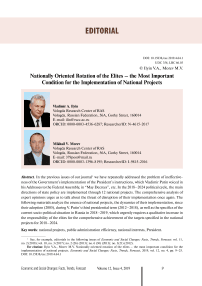Nationally oriented rotation of the elites - the most important condition for the implementation of national projects
Автор: Ilyin Vladimir A., Morev Mikhail V.
Журнал: Economic and Social Changes: Facts, Trends, Forecast @volnc-esc-en
Рубрика: Editorial
Статья в выпуске: 4 (64) т.12, 2019 года.
Бесплатный доступ
In the previous issues of our journal12 we have repeatedly addressed the problem of ineffectiveness of the Government’s implementation of the President’s instructions, which Vladimir Putin voiced in his Addresses to the Federal Assembly, in “May Decrees”, etc. In the 2018-2024 political cycle, the main directions of state policy are implemented through 12 national projects. The comprehensive analysis of expert opinions urges us to talk about the threat of disruption of their implementation once again. The following materials analyze the essence of national projects, the dynamics of their implementation, since their adoption (2005), during V. Putin’s third presidential term (2012-2018), as well as the specifics of the current socio-political situation in Russia in 2018-2019, which urgently requires a qualitative increase in the responsibility of the elites for the comprehensive achievement of the targets specified in the national projects for 2018-2024. 1 See, for example, editorials in the following issues of Economic and Social Changes: Facts, Trends, Forecast: vol. 11, no. 2 (2018); vol. 10, no. 3 (2017); no. 2 (26) (2013); no. 6 (30) (2013); no. 3(21) (2012).
National projects, public administration efficiency, national interests, president
Короткий адрес: https://sciup.org/147224207
IDR: 147224207 | УДК: 354 | DOI: 10.15838/esc.2019.4.64.1
Текст научной статьи Nationally oriented rotation of the elites - the most important condition for the implementation of national projects
The history of priority national projects in Russia dates back almost 15 years: on September 5, 2005, at a meeting with members of the Government, the leadership of the Federal Assembly and members of the Presidium of the State Council, Russian President Vladimir Putin raised the question of “creating new mechanisms to improve the quality of life of Russian citizens significantly” and stressed his personal participation in the implementation of priority areas such as health, education, and housing: “During subsequent work, I ask that we focus on the said priorities. To this avail, a council for the implementation of priority national projects will be created, and I will personally supervise its work” 2 .
Since then, the continuity 3 of goals, objectives, key directions, policy implementation, etc. can be called one of the main features of national projects. It characterizes the state policy on the implementation of national projects as a system designed for longterm work with the appropriate formulation of specific criteria, indicators, terms, and persons responsible for their achievement.
However, this continuity also has its “weak” points such as the consistent reproduction of the practice of non-achieving the planned result. Many experts – scientists and representatives of the civil society have already spoken a lot about this4. Many of them note that the main obstacle to the development of the Russian economy is “opportunistic behavior of the state bureaucracy and major entrepreneurs”.5
The opportunistic behavior of the Russian bureaucracy has a wide-scale and deep its impact on the life of Russian society. Some of its representatives ignore the objectives of the reforms or conduct them with a focus on their group interests. This manifests itself in embezzlement of the state budget, corruption, etc... Some of the Russians who have enriched themselves over the years of reforms perceive structural and technological innovations, as well as the necessary social changes, as a potential threat to their privileged position and tacitly counteract them. I n fact, Russian business, especially large business, is refraining from solving the problems of technological modernization of the economy and its diversification. Some representatives of the Russian bureaucracy hold a similar position...
The large scale of opportunistic behavior of large groups of the population indicate the growing inconsistency between current institutional reforms and the needs of society; under the circumstances, it is necessary to replace them... The main conclusion is that the difficulties encountered on the way to the recovery of the Russian economy arise from the opportunistic behavior of the state bureaucracy and major entrepreneurs 5 .
This means that these entities “seek their own interests, ignoring the law, abusing market power and official position... in fact, they weasel out of their responsibilities to address the issues of technological modernization of the economy and its diversification” 6 . 7
The major power of the Russian elite is the liberal clan that serves global financial speculators against their own people and strives to return to its “blessed” 1990s... The victories of the liberal clan include the reappointment of the Medvedev Government in 2018, the pension reform, the VAT increase, an insane tax maneuver (that inflated gasoline prices and made its production unprofitable), and the growing discontent of society... 7
Under these conditions, the criticism and pessimistic forecasts of experts regarding the realism of the implementation of national projects in 2019 become quite understandable (Insert 1) 8 .
In 2019, researchers from Vologda Research Center of the Russian Academy of Sciences (VolRC RAS) analyzed the datasheets and expert opinions on the national projects “Demography”, “Healthcare”, “Housing and Urban Environment”, and the Comprehensive plan for the modernization and expansion of the main infrastructure for the period up to 2024. According to the results of this review, it was concluded that the measures aimed at the implementation of the goals lack financial support, that the national projects neglect a number of objective demographic and socioeconomic trends, and that the quality of the used criteria for evaluating the effectiveness of the activities is insufficient.
In a concise form, expert assessments are summarized 9 in Insert 2 . The data clearly show that before their implementation the national projects were not subject to broad, large-scale discussion either in the expert community or among the public; although this would have eliminated many of the shortcomings that arise today during the implementation of the national projects.
The expert assessments presented in Inserts 1 and 2 suggest with a high degree of probability that the practice of non-fulfillment of national project targets will be repeated, and, therefore, their essence is not so much economic and not so much political (since they are developed and implemented after the beginning of a new political cycle), but rather psychological, due to the fact that they are used as a tool of political rhetoric in the classical version of the management of crowd psychology.
The founders of crowd psychology (G. Le Bon 10 , G. Tard 11 , S. Sighelе 12 ) at first considered the crowd only in a negative context, as a gathering of people “mostly with criminal inclinations, obsessed with harmful passions and desire for destruction; who are not engaged in any useful work and do not have their place in society” 13 . However, with the
Crowd psychology is a field of psychology, which studies the nature, essence, laws of occurrence, formation, functioning and development of crowds and masses as specific forms of human communities. It was created in the late 19th century by French sociologist and psychologist G. Le Bon, Italian psychologist and lawyer S. Sighele (1868–1913), etc... Traditional research subjects of crowd psychology include various gatherings of people, demonstrations, rallies, phenomena of mass euphoria, aggression, panic, etc.
To a certain extent, crowd psychology is focused on Le Bon’s “psychological law of the spiritual unity of the crowd”, according to which in the later phase of the formation of an organized crowd, there is a leveling, depersonalization and deindividualization of people in it; which is why on the basis of shared qualities managed bythe unconscious a temporary “collective soul” of the crowd is formed 14 .
The origins of the idea of crowd psychology were laid in the theory of imitation by G. Tard, who argued that social behavior has no other explanation than through the idea of imitation 15 .
development of psychological science itself and, in particular, with the increased interest in group psychology, the idea of the crowd has lost its negative connotation and started to be interpreted to a greater extent more neutrally – as1415 a “relatively stable gathering of people with its own purpose and common intentions”16 (this happened in the mid 20th century). It should be noted that this was largely facilitated by the emergence of the term “the masses”, which became widespread in the second half of the 19th century within the framework of Marxist philosophy: the term “masses” meant “workers, that is, the people who are engaged in material production and play a decisive role in the development of society; the masses became the main force in the era of revolutions they were opposed to the ruling and intellectual elite”17.
Non-critical thinking, hyperbolicity of thinking; ignoring the facts; simplicity and emotionality of perception; respect for power and the need for a leader – all these and many other regularities of crowd psychology allocated by the classics of this research area are fully present in our country today.
“The images that strike the imagination of the crowd are always simple and clear. Not the facts themselves amaze the crowd, but the way they are presented to it... The crowd does not think or consider. It is capable of perceiving only those ideas that are simplified to the limit. The judgments of the crowd are always imposed upon it, and are never the result of a comprehensive discussion. The crowd never seeks the truth. It turns away from any evidence it does not like, and prefers to worship delusions and illusions, provided that it likes them 18 . “The masses are easily manipulated and gullible. The person who would wish to take advantage of the masses would do best not to employ reasonable arguments but propose, rather, fascinating visual images which they should repeat again and again. The masses fall under the truly magical power of words”… 19
Isn’t it true that all these long-studied characteristics are extremely suitable for describing the modern relationship between society and power? They fully explain, for example, why at peak moments (no doubt,
Insert 1
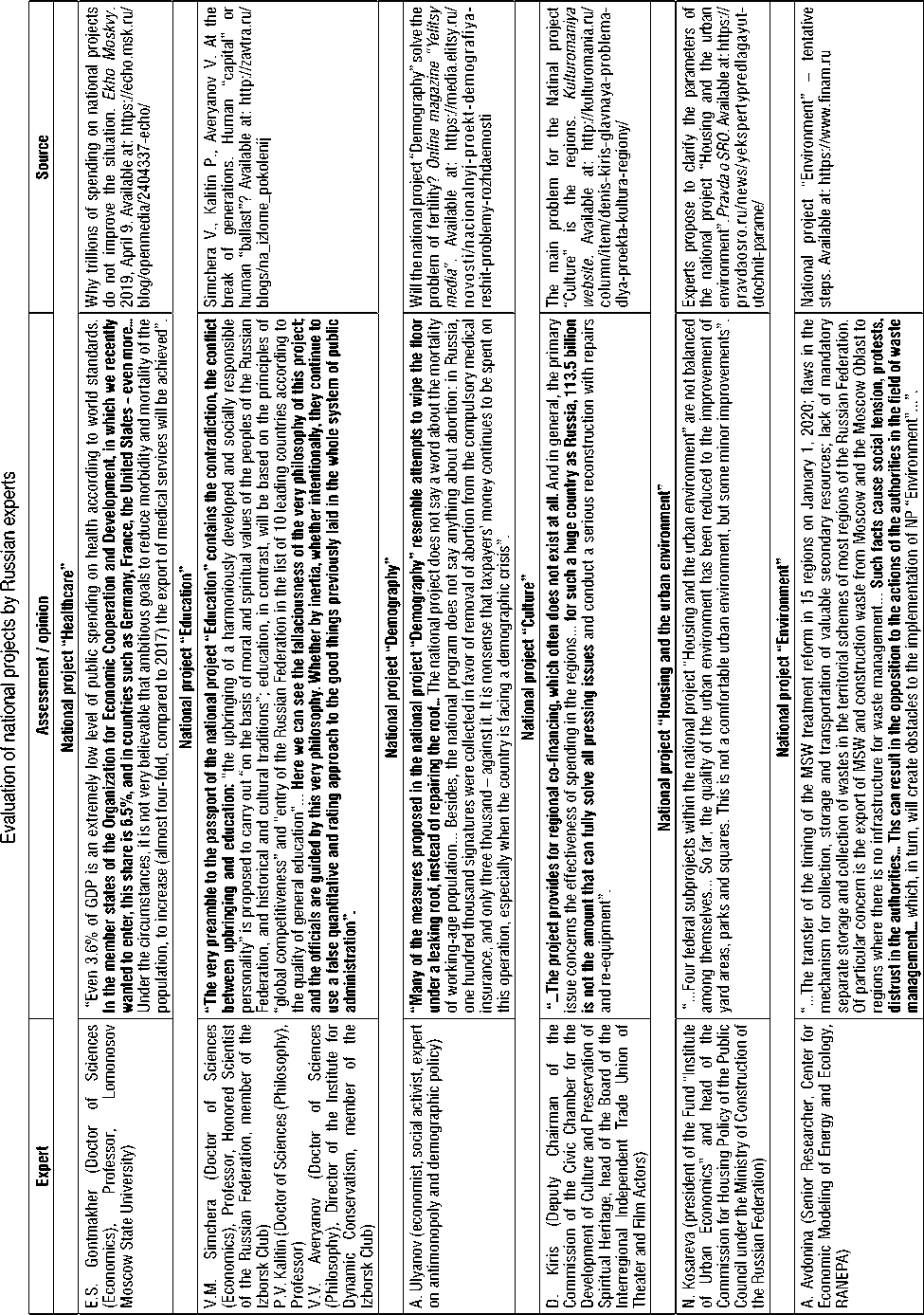
End of Insert 1
|
от |
о >* от 2 |
-g ^^ §-0О Q gig = ЕЕ£ о - 0/3 Q.-O С^СО 5 Я ” > О) у о ф d pgs | | — о QJ ^z о “ ” Щ S = ° 'g"^ "О ^ - ■ g g ™ CD Я со ■*-_, -^ га g ~ "го о S Н -Е ° LC 'о < |
ОТ 2 |
11^ го g-g S£| "^ СО „ ■ ° О~ о с "s' о Е -ст Я ^ 03 X) IX) ^СО С -2 |
"cd га "> ■а "от "> о Е от 2 |
So-g "5)“S 2 см-'§ си см <С -С ^ ° § § .Е _°с о .Я о со Сс "О < ^ ™oS g |
Е a 2 |
£от^ га_£ Е CD С -п » ■ст га га о от Я Я с "о с О ОТ CD m Я -2 СТО £ F ^ -^
i .2 3 = от га ^ -= от со __ от га cd э га аз Ст - от х 5 о” £^5 го Е 3 =5 r Е
|
ъ >- Е 2 |
со га о аз "^ ст с °-8 "<5 ^8 о 2 ™ 2 ^ й Е ГО S ° 4= о ст-^а га —। ст । со 0.2 _ • га о § "5 Г g g % = t S е И га "га 3 ^+1 -х с о га ст > "^ Е ’ey Е 2 аз ,2 $ 11.1 ^ |
2 |
с га ^ о с Я га та ОТ С с "ст £ „-| ° с ^ от Я5 .Я та СТ Я ОТ ° 2 с 8^85= ас о g. от /~) га га аз от "га Я ст " 'З °та о t от .от, о 5 S |
|
Е < |
"“5 5 = “ та от от со ^ га с" со ^Z о £2 ^ 1Е ” о. ° га w со f § Е "^ -о ^ я - 3 Л 5 “ £ о =-"£. о g g, 2 “^ ±± га со со ^ го 8-8 ^5-5 S ° > 4g "су S S со 5 -о о "го " CD Хо Е ~ о 2 го 8S s ~й= g S 5 с “ » .ост с S -- _е Я ~ I 0/3 от с Г ^У $t5 = Ъ ОТ 8 та ОТ W та Я II ст со Я о и- О cti ^^ а с ф с СО га _ — га — "Й со "су g 2 =- g ч- ИР О CD ОС ° g "о ° ст о оз 0^88 X > 03 2 О- Cti ° "С L1— ° g 8 £ ° о Я 8 Я я .Е |
era*. о ^ ю g1 &° Hi | от |.e| 5 is о щ =1 ■2. о ° 2 И И ^"о ,е5 та Я ст СО СО СО ОТ ^ о см = ° 5 о ° о 5$-= “ 2 g .Е го-Е gf 1 S С °- го ” “ О 8 — ГО |
g о. СО СТ О ч— Я о О
го ^ “ и g ' ас <7 го
Е -а § о - : .го ~ -X со о. > га о “ 8 8,^ ° = и й = g ■- Го Е "8 ГО "й ф _- о — ^ с § S ^ О Е Е Я "от о 4=1 га | g § й= : g "О СО ” СО с -S2 $ О О о со с СО О О CD от со § Я ^ |ВЪ«£ "° го ™~ CD а5 _О П5 "О -С С CD о с 00 S ОТ ^ CD Я ОТ С О га E cd
|
с ОТ С ОТ <2 с >4 к ■ о 2 ° ° ~ от .= га сз аз -гз а “ - й оБ 3 5 Ь з==хосЕ5 О Ф СО (Ц о 5 с от 5 23 от аз о о Е о го ™-Б.е ” — Я ■= от —- Я о = о =. Е-а “ S 2 *- -с ° от -^ .Е ,с аз S с га "о -о 5 о "з 03 с я ЕgЗ^ёgg8 СТ В _> ОТ с с о та о от га £ ° от = 31 ё 2S S.2 со о , Я > со га 5е>^8^фЕ ^ о S .га ото с С от та О К l^l^giE S " а 2 Е о-'й ь аз с в -о "Ст со racDcoSrara-^o ~ со аз ст х о со n аз p^SSSvs ™-iroSS'§E-= о^-аз^о'ораз S г >.-5 ЕЕ о ~ с с 3 Sc^oraOra^ аз о та с Е та та га _аз га 2 таОазфОТазот с о,_с о -С СО £ со < й
±± та га со о 2 аз "о о с та га_ га £ _га ,аз аз га "о > — 2Б ^ "ст "Б Я о 3 S от га о о о га ^ от ст'аз аз ^Е^ЗтагаЪЗ |
CD £ ° ~ ^ та .о о "Я Е та _от та 5 га ОТ та -2 "и — ^ "§ О 3 5 .Е "о — .от S И о. S о >, ^ g о. го § го ™ с 2 о ° ° О ""Я ~ от О "> с 5 ^ Ё£ " .ОТ От 05 ч_ ^ 1 3-^ га- о о я га см о и о > га § ° Е аз с о от ст .2 "с £ "2^8-20 ■— .2, от ст со >ч о аз Е -2 о g О та С -8 ° 2 £ 8 = н = g 5 о ст га с -9 ч— -2 см Я .2 о со • _> от t 3 cd га та Я от от с ™ й2 о от ст га от ст та "С ОТ га го ~ e-"s 2 '2 ^та от .га Я о ОТ о "от =~ < ^ S 5 |
от с Я ст от Q .Е я Я "Я от Е о S g ° g^ ■О g СО 2 Я От Я "от 8 о ОТ От О. ГО -О о ” Н ° от ст о со ,о Я О °- у "1= 7 о.ге g । о О от га о .от от is'st та от о от О) та га Я ^ о^.й|" Я Я Щ я 8-я | с .у я ° ^ « Е ifii| 3 2 5 от" Е - о с g 1^ га Еот га ст .2 гф С О Q > та Я с "F Я 3 Я Е ° 3 та £ та . от S= 8я S g и "5 "g 2Йй^ га : "с - • 2 g от от от от ст о со о 8 8 ~~ "су " "5) g- g со 8 ст£ 5 .от "га СТ ^ "§ 3 -Е |
||||||
|
ш |
"с5 ст ё о О? 8-” ст та Q^ |
° S £Ъ ^ ш .Е от ч— -X о ^ -о |
О о о < Sot > 5 |
о ° ст Е ^ о ^ Ст О = S Ill аз аз со < ш 5 |
S | ч- CZD Е° Е.5 S ° от га ^-_ S °" "5 < ^ а |
3 ^3 от та ^ СО От Я ОТ —5 ”0-5^ аз та от га о 5 ° н Illi ° ° 0 Я С 3 та й о р .2 от .Е >S Е5 |
Insert 2
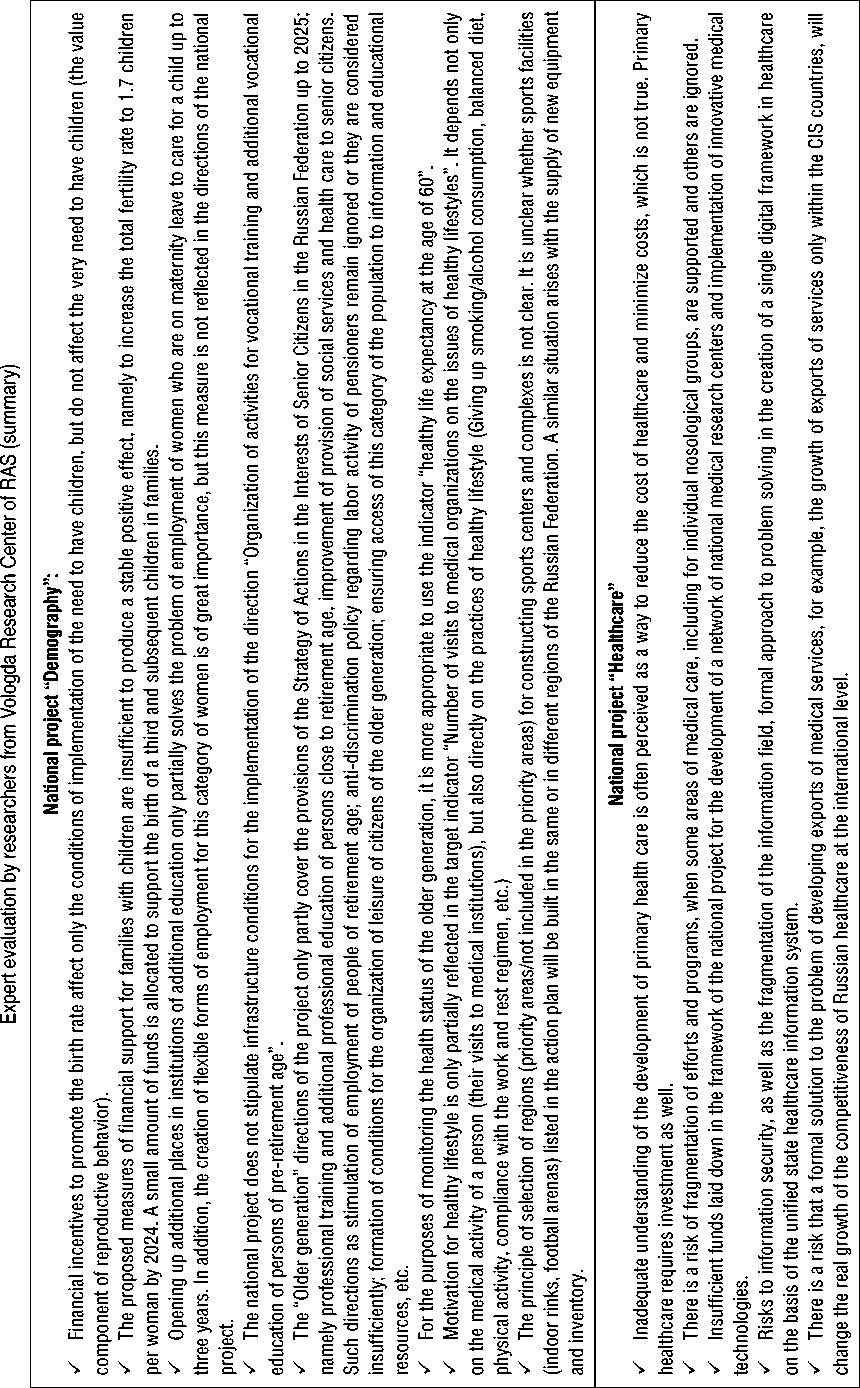
End of Insert 2
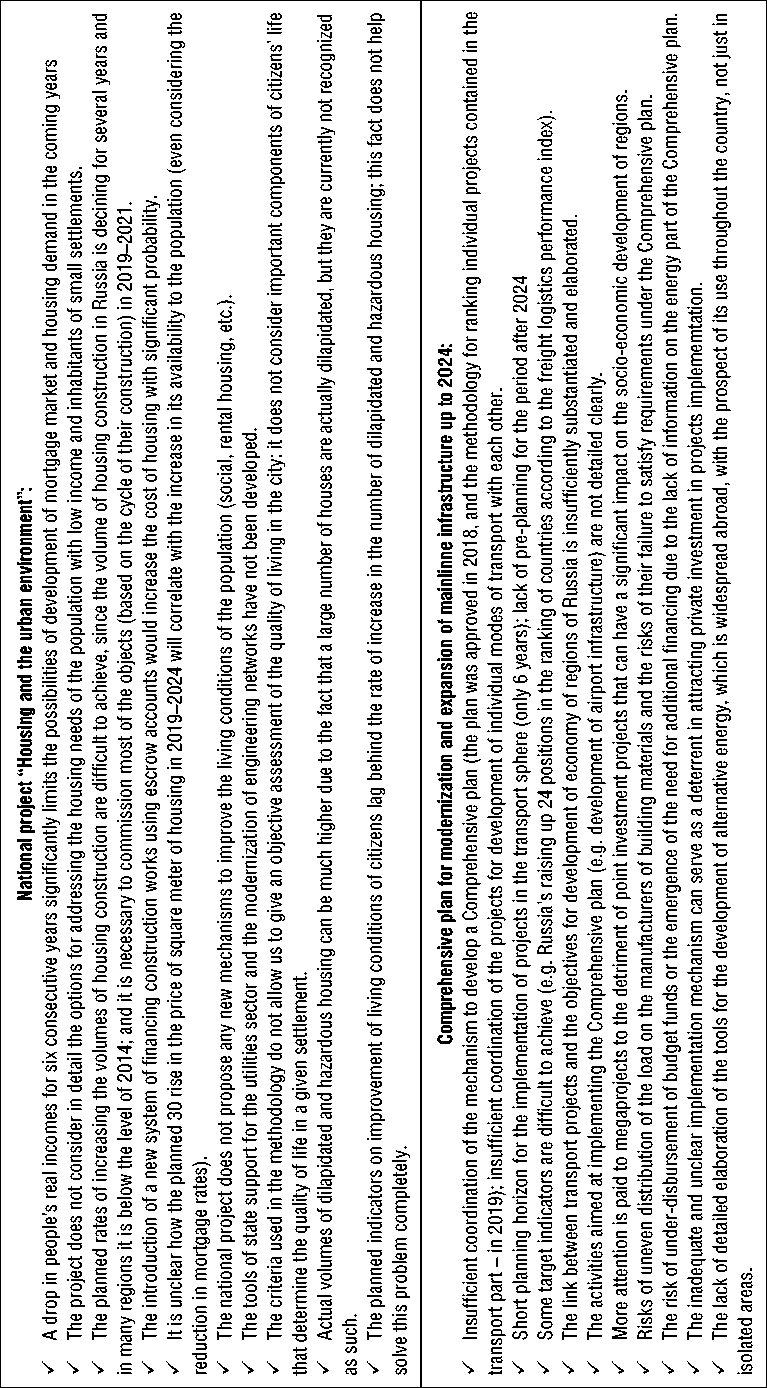
Figure 1. In your opinion, how successfully does the Russian President cope with the problems related to economic recovery and the growth of citizens’ welfare? (% of respondents)
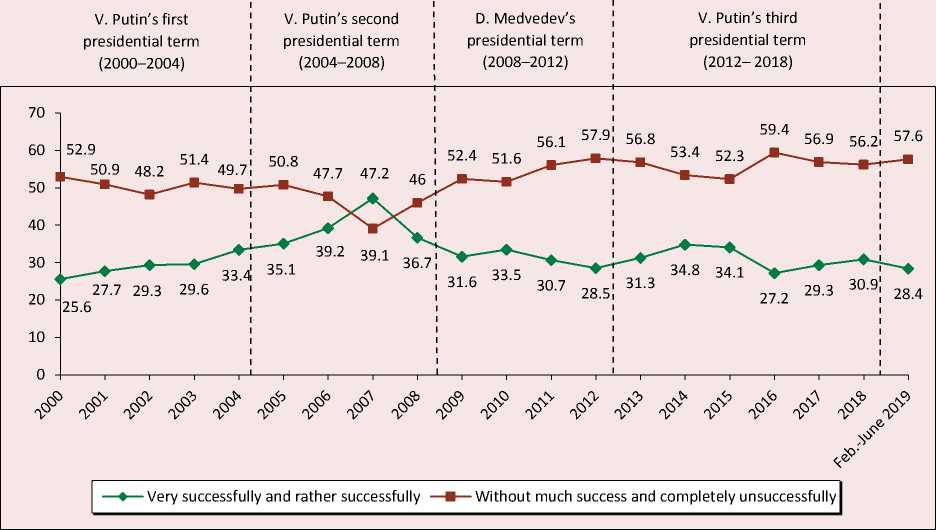
an election is such a moment) the President and the party in power gain a record number of votes of support, while throughout the political season there remains a high level of dissatisfaction in society concerning the way in which these very authorities implement the same policy issues related to the dynamics of the standard of living and quality of life (Fig. 1).
And just as precisely the formulation of the main goals set out in national projects (first announced in the President’s annual Addresses to the Federal Assembly of the Russian Federation) sounds reassuring, although more than half of Russians, according to sociological surveys, do not believe that the designated development targets will actually be achieved.
Let us recall that after the President delivered his Address to the Federal Assembly of the Russian Federation in 2018, the majority of Russians (53%) noted that the tasks he had voiced would not be fulfilled. Moreover, according to 47% of Russians, they would not be implemented “because of corruption and bureaucracy in the government”, and only 3% said it would be due to the fact that “the President’s proposals are too general, non-specific”20 (Fig. 2). According to RAS Federal Research Sociological Center, from 30 to 46% of Russians felt that the most important tasks of the Presidential Address of 2018 (increasing the average life expectancy of Russians to 80 years; increasing real incomes of working population and increasing pensions; improving the availability and quality of medical care and educational services, etc.) would not be implemented21.
Figure 2. In your opinion, to what extent are the tasks that the President announced in his Address to the Federal Assembly of the Russian Federation realistic, and will they be fulfilled or not? (all-Russian data by VTsIOM, closed-ended question, one answer; in % of those who lisneted to the Address or learned its content from the news)

—•— The President announced concrete, real tasks and, most likely, they will be fulfilled as soon as possible
— ■ — The President announced concrete, real tasks, but they will not be fulfilled because of corruption and bureaucracy in power
—*— The President's proposals are too general and vague; they are impossible to implement
— ■ — I find it difficult to answer
Source: President’s Address to the Federal Assembly: first impressions: VTsIOM press release, 2018, no. 3602, March 13.
Available at:
The practice of public administration based on the laws of crowd psychology, apparently, continues to be implemented in the political season of 2018–2024. At least it is implemented by the same people who failed to achieve the goals set out in the previous orders of the President. Criticism of national projects of 2018–2024 points to the same “sore spots” as in priority national projects of 2006–2018 (insufficient funding, ill-considered evaluation criteria, etc.) and meanwhile the political system witnesses the same struggle for power on the part of various groups, which in 2012 was mentioned by experts from Minchenko Consulting Group: “The process of ruling aims primarily to sustain the existing inter-clan balance... Russian power is a conglomerate of clans and groups that compete with one another over resources” 22 .
... Against the background of institutional proposals to modernize the system and arguments about the link between the government and the people, Russian political history continues to degrade. The autumn gubernatorial elections will be held in a purged competitive field – in order to guarantee the stability of the results... But another point is important. An attempt to legitimize power in the conditions before, during and after the transit with the help of the changes in the system of public administration, but without reliance on the real interests of society, can only result in a greater gap between the elite and the people. It would be good if the changes began with the people rather than with the Constitution 23 .
23 Today, people may change, but the essence does not change: the political system is being “rebuilt” on the basis of the results of
“undercover games” of elite groups rather than the interests of national development and the needs of the majority of the population, and this also indicates the “continuity” of the basic principles of building relationships between society and government.
However, the inability of the political system to transform itself dynamically is in conflict with the qualitative changes that have occurred over the past almost 20 years in Russian society. During this period, society has changed dramatically: in the demographic, economic, and psychological spheres... Not all of these changes are positive, but it is important to emphasize that the social transformations have resulted in the growth of public awareness of its own subjectivity. Today it is reflected in an increasing need for changes 24 , in the increase in the number of Russians who do not count on the support of the state 25 , and in the sensitivity
Everyone was horrified by the results of the research carried out at the Institute of Psychology of the Russian Academy of Sciences on the dynamics of the psychological state of our society, which were published in late 2013... Over the past 30 years, all the negative traits (permissiveness, violence, aggression, hatred, hostility, arrogance, greed, anger, cruelty, rudeness) have aggravated in Russians, and the positive traits (discipline, reliability, decency, humanity, kindness, compassion, selflessness, mutual respect, altruism), on the contrary, deteriorated. So much for the difference between the two worlds – the socialist and the capitalist... 26 .
and the severity of public reaction toward various episodes of social injustice on the part of the authorities with regard to the people – from the uncoordinated construction site for a church in Yekaterinburg to the non-admission of independent candidates to participating in the Moscow City Duma election.
We should note that according to the nationwide data by VTsIOM and regional data by Vologda Research Center, the likelihood of protests and most importantly the willingness of people to participate in them have not decreased to the values that preceded the public announcement of the draft pension reform (June 2018). Twenty seven percent of Russians and 20% of Vologda Oblast residents are ready to take part in protests – these figures are not only significant and create a situation in which “violent events can often unfold” 27 ; they exceed those registered in the first years of V. Putin’s each presidential term (Fig. 3 and 4).
As society becomes more “mature” in the political and civil aspects, the mechanisms of influence on public consciousness that are traditionally used by the government will increasingly lose their validity, but there is no alternative to them yet.
This is evidenced by the current and prospective situation in the country, which continues to degrade demographically, economically, morally and (as we can see from the increase in social tension) socio-psychologically:
-
V the demographic situation is such that only in four months of 2019 we reached natural population decline of 149 thousand people... In fact, we had such a decline in 2007. We faced similar situation twelve years ago” 28 ;
Figures 3–4. Proportion of people who consider mass protests possible and who are ready to take part in them (% of respondents)
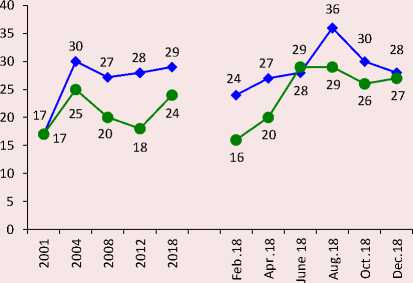
Protests are possible I will take part in them
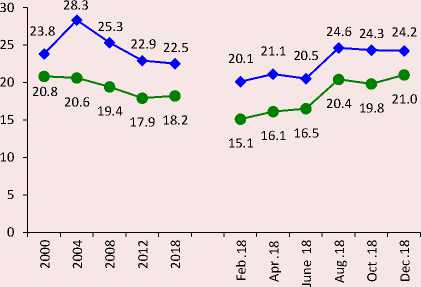
Protests are possible I wil take part in them
VTsIOM data (for Russia)
The wording of the question: "In your opinion, what is the likelihood of mass protests against falling living standards, injustice on the part of the authorities and in defense of your rights in your city/rural area? Will you personally take part in them or not?" Source: protestnyj_potencial/
VolRC RAS data (for the Vologda Oblast)
The wording of the question: "In your opinion, can mass protests against rising prices and low living standards be held in your settlement? Will you personally take part in them?". Source: VolRC RAS database.
The most surprising thing is that now (unlike the mid-2000s), when you study poverty in Russia, you no longer feel any shock or surprise. And this indifference is dangerous, as it characterizes the usual social depression. It is not surprising, because not only the poor are poor in Russia, but virtually the entire Russia is poor. Median monthly income in many regions of the country is only 250–300 USD. According to this indicator, our once industrial regions are now equal to the poorest republics of the CIS and the countries of Africa. Air travel, vacation, education of children, quality medical care are hard-to-reach or even inaccessible benefits for the majority of the middle class 29 .
V “one-third of Russian regions lives very close to the poverty line” 30 ;
V “given the current economic policy (tight fiscal policy and tight monetary policy) and the weak effect of national projects, technical recession in the economy can be recorded already in 2019, rather than in 2021”31.
A rather pessimistic picture emerging in the expert opinion on the present and future of the Russian economy and on the demographic situation is directly related to the moral irresponsibility of the ruling elites, who allow the non-fulfillment of direct orders of the head of state and ignore public opinion trends. However, in his public speeches the President (who, in fact, agrees that not all the indicators set out in the national passports of the projects are being implemented to the fullest extent) regularly says that without setting ambitious goals we would not have had those results that we are now proud of (Insert 3).
Insert 3
Insert 4
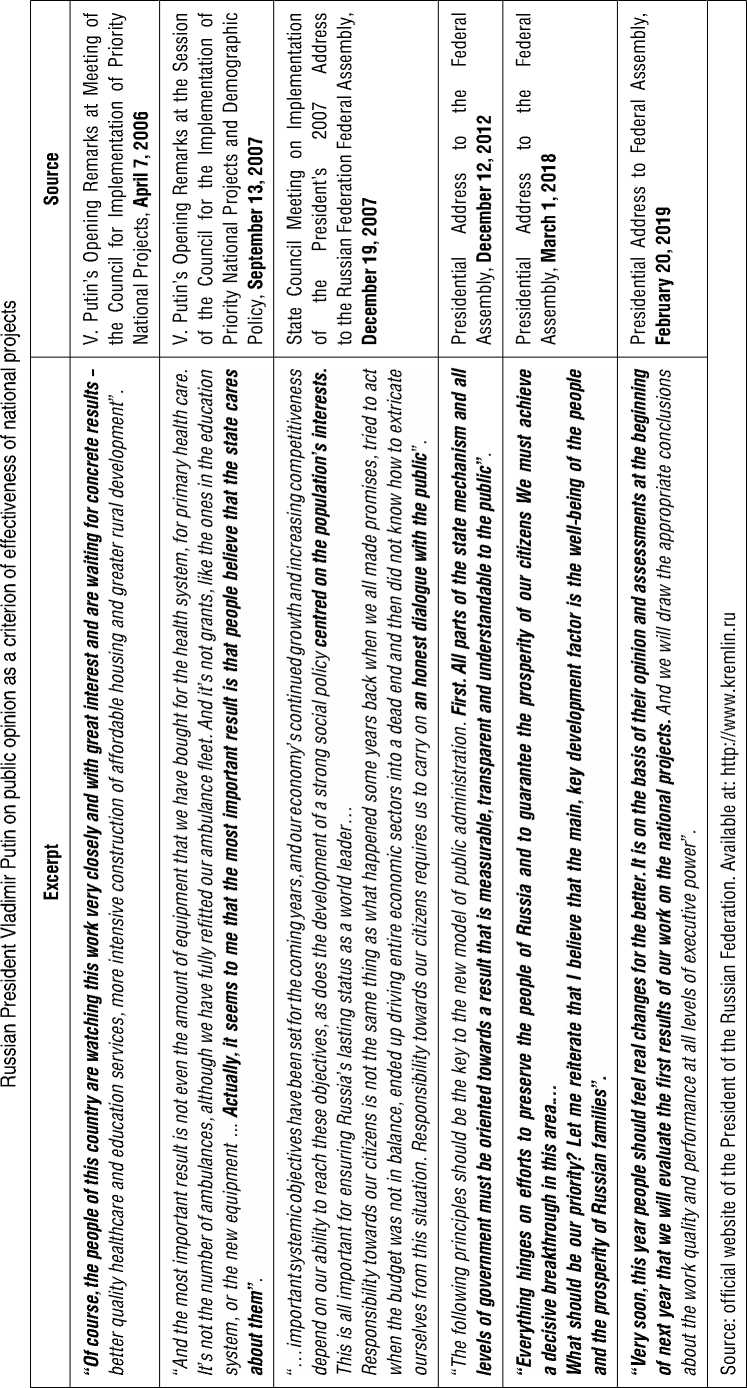
The initial message of the head of state, therefore, comes from the fact that it is important not so much to achieve the goals of national projects, but to ensure a stable and, most importantly, really tangible dynamics of growth in the standard of living and quality of life for the general population. V. Putin noted at one of the meetings on the implementation of national projects: “People are not interested in abstract promises… The result is what matters for people, here and now, not in some distant future. In any case, people should see that the process is underway, that it is positive and leads to these results” 32 . Moreover, to assess the effect of the implementation of national projects, in the end, mst be perceived by those for whom they are created – Russians themselves. In V. Putin’s Address to the Federal Assembly of the Russian Federation in 2019, this idea sounded particularly clear, but it was also not the first time that he voiced it (Insert 4).
This approach, which is based on the priority realization of national interests not only in foreign but also in domestic policy, cannot but be supported. However, real practice shows that the ruling elites do not share it.
“Around Putin in twenty years, a circle of devotees he personally trusted has been formed, but there are no signs of a circle of like-minded people who share a single ideology, whose thinking abilities are not reduced to the tasks of annual budget and short-term objectives, but who have a vision of what the future of Russia in ten or fifty years should be. There are no futurologists, no real ideologists, and no social designers among V. Putin’s closest associates. Trying to look beyond the horizon of two or three years is considered bad manners. Therefore, so far, a global mobilization Development project has not been launched, and not a single one of the declared national projects has been properly executed”33.
The level of trust in Vladimir Putin according to VTsIOM is 70–73% in 2019. For comparison, the level of trust in Dmitry Medvedev and Vladimir Zhirinovsky is 34–37%, Gennady Zyuganov – 30–34%; Sergey Mironov – 27–29% 34 .
As a result, national interests remain only at the level of goal setting and public speeches of V. Putin himself. And therefore, it is for a reason that Russian society “trusts only the President” 35 in the entire political system of our country. But the objectively difficult economic and demographic situation in the country, the need to address key problems of people’s concern (associated primarily with a high level of social inequality, poverty, inefficiency of “social elevators”, etc.), a stable level of social tension in society – all this remains acutely relevant and represents a real threat to national security.
Thus, we cannot but agree with experts who draw attention to the fact that in order to establish new and effective mechanisms in the system of public administration, the rotation of elites is necessary; and therefore, the main task for the President today (because only he really has the opportunity to implement it) is to make this process as manageable as possible and focused on the implementation of national interests. It is important not to allow the rotation of elites to be spontaneous (as it is now), because in this case it becomes a struggle for the political future of various groups and players. According to experts, “being in the grip of pre-transit turbulence and the need to show economic growth, the Russian elite is doomed to generate new ideas and reforms. This does not mean that a significant part of them can be implemented, because some authors do not have enough motivation, others – resources. But everyone has to be dynamic and visible to stay in the game and qualify for career lifts”36.
Thus, society does not really participate in the rotation of elites and therefore has no opportunity to ensure that national interests occupy a priority place in the motives and priorities of their activities. In these conditions society that has changed in the post-Soviet period can “react” in two ways: it can either “withdraw” and estrange itself from the issues of national development and focus on achieving individual success (what we are seeing now in the form of the increased layer of “selfsufficient” Russians who take responsibility for themselves, but at the same time, easily cross the line of moral standards and are unable “to succeed without abandoning moral landmarks” 37 ); or it can radically change itself and increase the degree of its demands to the authorities. Both options pose serious threats to the Russian statehood, and it is unknown which one is better. Because in the first case we are talking about the loss of the national character of key development issues (in particular, such as the education of the individual, citizen, patriotism and national identity), and in the second case there is a high probability of sharp actualization of social upheavals, including irreversible ones, comparable to the events of 1991.
Indeed, the President has almost no “time for a sluggish start” in solving the problem of effective transition of the political system to a new political cycle. Not only because the period of 2018–2024 is his last (according to the current Constitution of the Russian Federation) presidential term. But also because the moral degradation of society emasculates the potential administration corps of the future, makes it simply unfit to govern the country.38
For 50 years in general, the whole society has deteriorated markedly, and there is simply nowhere to choose smart leaders... The degradation of society began in the late Soviet period and continues now. No efforts of the Communist Party and its successor elite could stop the process of global stupefaction of the population living in an atmosphere of global mass culture and consumer values. No reform of the education system can replace the environment in which modern man is formed both in the West and in Russia. And the fact that new education systems are worse than previous ones is also a consequence of the fact that they are created by already degraded products of society.
It is also wrong to reduce the degradation of education only to a conspiracy of the world elite – this elite itself has become significantly stupid over the past half century. It is no longer able to save itself from disaster, and it floats at the will of the waves, like a cork or some other substance. The problem of rotation of elites is not that the old ones do not let the new ones in, but that the new ones do not physically exist. And what exists is even worse than what is in power now... 38
In early 2018, Vladimir Putin announced his intentions for the next six years: “We need to take long overdue, difficult, but extremely necessary decisions”39. However, so far, the problems of the effectiveness of public administration and the dynamic growth of the standard of living and quality of life remain relevant. The time factor works against the head of state, every month and year it tightens the knot of public impatience and discontent with the state of affairs in the country, with how the government communicates with the people (especially at the local level), what steps the Government is taking to implement the goals of national development.
The future of national projects (as well as the preservation of the Russian statehood in general, finding a solution to key internal and external tasks) will depend on how the President will be able to overcome the formal and “stencil” approach with which his instructions are executed by representatives of the bureaucracy at the federal and regional levels. Without a vigorous rotation of the elites, based on the principles of high professional competence and service to the national interests, the problems of effective public administration are unlikely to be solved. From this point of view, there is a high probability of continuation of the sluggish political and economic situation in the country, that is, the conditions that contradict the strategic goals of national development announced by V. Putin in his Address to the Federal Assembly in 2018, and the conditions that are not able to ensure the successful shift of society and power to the new political cycle of 2024.
Список литературы Nationally oriented rotation of the elites - the most important condition for the implementation of national projects
- Vlasov F. Costs of opportunistic behavior of social groups. Obshchestvo i ekonomika=Society and Economy, 2019, no. 6, pp. 35-44. (In Russian).
- Glazyev S.Yu. National projects - illusion or reality? Zolotoi lev=Golden Lion, 2007, no.101-102. Available at: http://www.zlev.ru/101/101_52.htm. (In Russian).
- Petukhov V.V. Dynamics of social mood of Russians and the formation of a request for change. Sotsis=Sociological Studies, 2018, no. 11, pp. 40-53. (In Russian).
- Gorshkov M.K., Sedova N.N. Self-sufficient Russians and their life priorities. Sotsis=Sociological Studies, 2015, no. 12, pp. 4-16. (In Russian).

